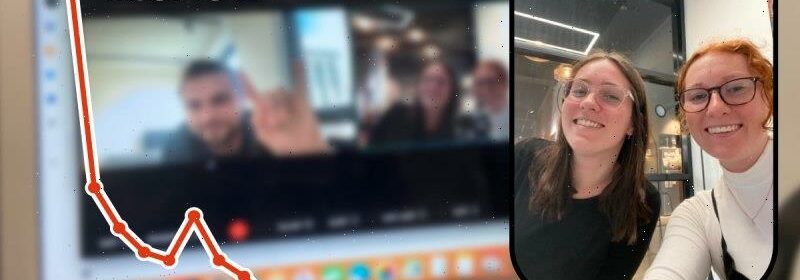‘It’s like an anti-Instagram’: What explains BeReal’s meteoric rise?

The rise of BeReal, the social media app that triggers users to post a daily spontaneous snapshot of their life, has been slowly simmering away for months. But it took a recent backlash against Instagram’s disastrous updates to catapult BeReal into exponential growth.
“It’s one of my favourite social networks to be honest,” says managing director of social agency We the People, Jacob Arnott. “It’s like an anti-Instagram. The mundane element of it, the rough and raw and unpolished content, is really interesting.”
Data from Google trends, which ranks a search term’s popularity out of 100, shows BeReal shot from 38 to 92 points the same week Instagram user @illumitati launched the Kardashian/Jenner-backed “Make Instagram Instagram Again” campaign.
This year, more and more users started to complain that Instagram has become bloated with too many features, ads and third-party videos that have trashed the app’s beginnings as a personal photo-sharing platform. The ire against Instagram amped up after short, full-screen video “reels” – often just recycled TikToks – were injected into users’ feeds.
In the new social media landscape, TikTok dominates the attention of Gen Zs seeking entertainment, Snapchat is for group chats, and BeReal satisfies the desire for intimate connection with close friends. That leaves Instagram out in the cold.
“What made Instagram great is not on Instagram anymore,” Arnott says. “This really aesthetic, polished place doesn’t necessarily have a place in the set anymore for a lot of younger users. It’s in no man’s land.”
Gen Z marketing graduate Portia McKee posts on Instagram about once a month, but BeReal keeps her coming back every day.
“You see people post their Instagram stories when they’re out and about with friends, at a restaurant or event, but you usually don’t see people just hanging out at their houses, at the supermarket or even just a comfort thing of seeing that someone else is also in bed watching YouTube,” McKee says, adding she enjoys seeing a more intimate side of her friends.
The app prompts users to post within a random two-minute window once each day. Users must snap and upload a photo taken with their front and back cameras to unlock their friends’ posts. It’s possible to do this outside the two-minute window, but the post is branded “late”.
McKee says she always tries to post within the two-minute window decreed by BeReal to keep her posts authentic.
But Instagram has trained us well; many users deliberately post late to capture themselves at parties or gatherings. Users say serial late posters are often chided in the comments.
In the wake of BeReal’s success Instagram announced its “Dual” camera feature, which is similar to BeReal’s format. Credit:Instagram
“A lot of my friends actually do post quite late and it’s usually a photo of them more done up or at some sort of event,” says McKee. “It’s kind of annoying that I’m being more honest about my days and others are just trying to show their social side.”
Another big plus for McKee is that BeReal is bereft of brands.
“BeReal has no advertising on it,” says Dr David Tuffley, senior lecturer in Applied Ethics and CyberSecurity at Griffith University. “It looks to be a counter-reaction to the hyper hoovering up of every bit of data that the big guys do, like Instagram and Facebook.”
Our addiction to the platforms has its roots in a deep instinct for sociability, says Tuffley. If feeds become too commercialised and devoid of the faces we know and love, the fundamental reason we log on each day is lost.
“It is part of our evolutionary past. We evolved in small family groups, extended family groups of 100 or less. We relied on each other because individually, we weren’t strong enough to deal with the big predators. We needed to be in the group in order to survive,” he says.
A cultural guide to going out and loving your city. Sign up to our Culture Fix newsletter here.
Most Viewed in Lifestyle
From our partners
Source: Read Full Article
